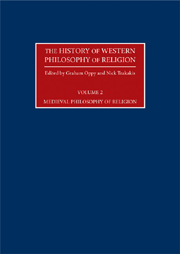Book contents
- Frontmatter
- Contents
- Editorial Introduction
- Contributors
- 1 Medieval Philosophy of Religion: An Introduction
- 2 Boethius
- 3 Johannes Scottus Eriugena
- 4 Al-Farabi
- 5 Avicenna (Ibn Sina)
- 6 Anselm of Canterbury
- 7 Al-Ghazali
- 8 Peter Abelard
- 9 Bernard of Clairvaux
- 10 Averroes (Ibn Rushd)
- 11 Moses Maimonides
- 12 Roger Bacon
- 13 Thomas Aquinas
- 14 John Duns Scotus
- 15 William Ockham
- 16 Gersonides
- 17 John Wyclif
- 18 Nicholas of Cusa
- 19 Erasmus of Rotterdam
- Chronology
- Bibliography
- Index
8 - Peter Abelard
- Frontmatter
- Contents
- Editorial Introduction
- Contributors
- 1 Medieval Philosophy of Religion: An Introduction
- 2 Boethius
- 3 Johannes Scottus Eriugena
- 4 Al-Farabi
- 5 Avicenna (Ibn Sina)
- 6 Anselm of Canterbury
- 7 Al-Ghazali
- 8 Peter Abelard
- 9 Bernard of Clairvaux
- 10 Averroes (Ibn Rushd)
- 11 Moses Maimonides
- 12 Roger Bacon
- 13 Thomas Aquinas
- 14 John Duns Scotus
- 15 William Ockham
- 16 Gersonides
- 17 John Wyclif
- 18 Nicholas of Cusa
- 19 Erasmus of Rotterdam
- Chronology
- Bibliography
- Index
Summary
Peter Abelard (1079–1142) introduces a new perspective into the philosophy of religion in the Latin West through his emphasis on the common source of pagan and religious philosophical insight. Although not the first person to argue that pagan philosophers shared some understanding of truths manifest through divine revelation to Jews and then to Christians, Abelard was one of the first teachers to create a coherent synthesis of theologia in which this insight was the driving principle. Boethius (c.476–c.525) had pursued philosophical enquiry into orthodox Christian doctrines relating to the Trinity, but never reflected explicitly on the relationship of pagan philosophy to Christian revelation. Rather than commenting on the Opuscula sacra (Sacred works) of Boethius, Abelard decided to create his own independent synthesis on the subject, a treatise about the Trinity, now known as the Theologia ‘summi boni’ (hereafter TSum). After the work was condemned as heretical at the Council of Soissons in 1121, he revised it in the early 1120s as his Theologia Christiana (Christian theology; hereafter TChr), transforming it yet again into his Theologia (the Theologia ‘scholarium’; hereafter TSch) by the early 1130s. This final version was identified by the famous Cistercian abbot, Bernard of Clairvaux, at the Council of Sens, held on 25 May 1141, as containing many heresies (Mews 2002).
- Type
- Chapter
- Information
- The History of Western Philosophy of Religion , pp. 97 - 108Publisher: Acumen PublishingPrint publication year: 2009

